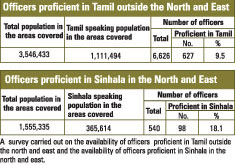While opinion remains deeply divided in the country about the full implementation of the Thirteenth Amendment to the Constitution, the recognition of Tamil alongside Sinhala as an official language guaranteed by the same constitutional amendment remains largely confined to paper with several key areas in the government sector lagging behind in executing the Official Language policy.
 |
| Raja Kollure |
Lack of resources, finances, trained personnel and unawareness have contributed to the slow pace of implementation of the language policy despite attempts by the government to correct the deficiency. With the end of hostilities and the opening of more public services in the north and east, the comprehensive implementation of the language policy seems more plausible as well as timely.
“The ethnic problem was largely due to the Tamil people feeling alienated particularly over the language issue and lack of equal access to the public service. It has become an urgent need to implement the language policy, says Chairman of the Official Languages Commission Raja Collure. A recent study done by the Commission covering a population of over 3.5 million of which over 1.1 million were Tamil speaking people living outside the northern and eastern provinces found that of the 6,626 public officials of all grades working there, only 627 or 9.5 per cent were proficient in Tamil.
A similar study was conducted in the northern and eastern provinces to ascertain the availability of public officials proficient in Sinhala. Of the over 1.5 million population surveyed of which the Sinhala speaking population was a little over 365,000, it was found that only 98 or 18.1 per cent of the total of 540 public officials serving, were proficient in Sinhala. “The language issues affect both communities but it is the Tamil speaking people who are more affected as they live in large numbers outside the north and east and this includes Muslims and up country Tamils who have no proper knowledge of Sinhala, “Mr.Collure explained.
Under the terms of the Constitution, Sinhala is the language of administration in all the provinces other than the Northern and Eastern provinces where Tamil is used. The same policy is applicable as the language of the courts in the country.
The Government issued two circulars in early 2007 pertaining to the implementation of the language policy, one offering enhanced incentive payments for public servants acquiring proficiency in both Official Languages and another making it necessary for all officers recruited to the public/ provincial public service with effect from July 1, 2007 to acquire proficiency in the other Official Language within a period of five years in addition to the Official Language through which they enter the service.
Nevertheless the incentive payments ranging between Rs 15,000 to Rs 25, 000 as well as denial of increments to public officials who fail to obtain the required proficiency within the stipulated period of time have not encouraged many to take the language issue seriously with the numbers sitting the proficiency tests conducted by the Official Languages Department highly unsatisfactory. Since July 2007, the Police Department has recruited nearly 12,000 personnel of all ranks while the Health sector and the Public Administration sectors have recruited around 8,000 each but only around 2,100 sat the last Language Proficiency tests conducted in 2008.
The situation with regard to Translators too is dire with less than 130 in the Translator Service of whom only 28 are proficient in Sinhala/Tamil, 82 in Sinhala/English and 21 in English /Tamil. Here too the number proficient in the two Official Languages is extremely poor, he said.
“Our fear is that these circulars will become a dead letter unless they are adhered to strictly. It is the obligation of the state to provide for the functioning of the language policy,” the Chairman of the Commission said.
While the Commission and the Department of Official Languages are the main government institutions empowered with monitoring supervising and training to ensure compliance with the Official Languages policy, the lack of funding particularly for the training programmes has restricted the services they can render.
“The provincial councils too are expected to play a role in the implementation of the Official Languages policy but their attitudes are very unsatisfactory. The different departments too need to get money from the government and implement the policy on their own as we have fewer funds,” Mr.Collure said. With many new police stations opening up in the north after the defeat of the LTTE, it has become an even more pressing need to train police personnel who can work in both languages, the Chairman of the Commission said.
While all recruitment to the public service is merit based and no language based recruitment can be done, he recommends that an auxiliary service be set up from where the necessary personnel can be drawn to serve in offices where their services are needed until the levels of proficiency among the majority of public officials reaches a satisfactory level and they are able to discharge their duties in both Official Languages. |


